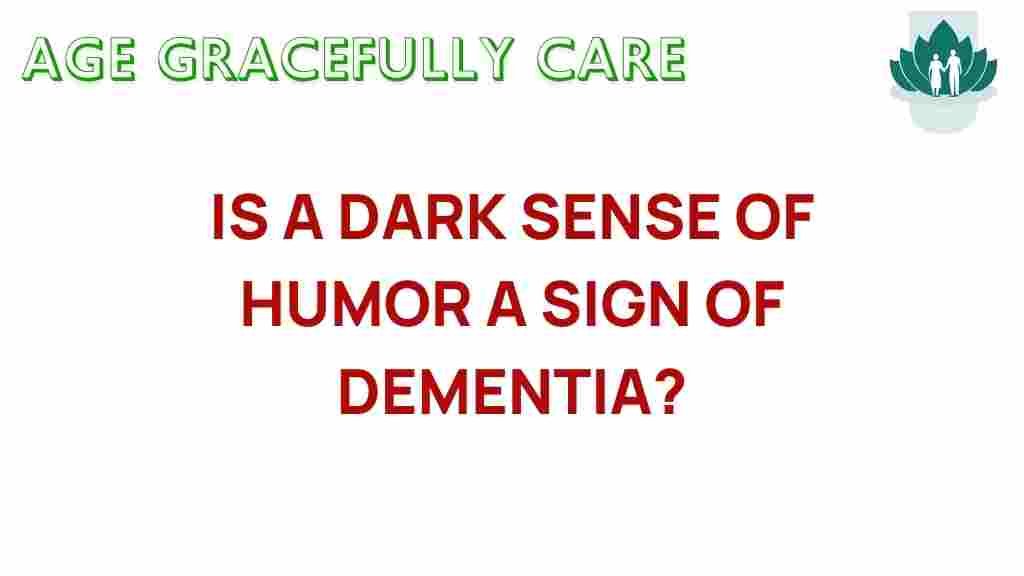The Dark Side of Laughter: Is It a Sign of Dementia?
Laughter is often considered the best medicine, a universal language that transcends barriers, bringing joy and connection among individuals. However, there lies a more complex side to laughter, especially as we age. As we delve into the psychology of laughter, it’s essential to explore how humor interacts with dementia and other neurodegenerative diseases. Understanding this relationship can provide insights into emotional expression, cognitive decline, and mental health in the aging population.
The Link Between Laughter and Dementia
Dementia is a term that encompasses various neurodegenerative diseases characterized by cognitive decline, memory loss, and changes in behavior. One lesser-known aspect of dementia is the manifestation of laughter, which can sometimes appear inappropriate or excessive. Here’s how laughter relates to dementia:
- Inappropriate Laughter: Individuals with dementia may exhibit laughter at times that seem socially awkward or out of context. This can be disconcerting for caregivers and loved ones.
- Emotional Expression: Laughter serves as a form of emotional expression, and in dementia patients, it can be a way to express feelings that may not be verbally communicated.
- Cognitive Changes: As cognitive functions decline, the ability to understand humor may change, leading to laughter that doesn’t align with the situation’s context.
The Psychology of Humor in Aging
As we age, our psychological relationship with humor also evolves. There are several factors at play:
- Life Experiences: Older adults often have a wealth of experiences to draw upon for humor, which can enrich their ability to find joy in life despite cognitive challenges.
- Coping Mechanism: Laughter can serve as a coping mechanism, allowing individuals to deal with the emotional toll of aging and potential cognitive decline.
- Social Interaction: Humor fosters social connections, which are vital for mental health, especially in older adults who may face isolation.
Understanding the Role of Laughter in Mental Health
Laughter and humor are intricately linked to mental health. The benefits of humor in the context of aging and dementia include:
- Stress Reduction: Laughter reduces stress hormones, promoting a sense of well-being.
- Enhanced Mood: Engaging in humorous activities can elevate mood, providing a temporary reprieve from the challenges of cognitive decline.
- Improved Cognitive Function: Some studies suggest that engaging with humor can stimulate cognitive functions, potentially slowing decline.
Step-by-Step: Recognizing the Signs of Dementia Through Humor
Recognizing the signs of dementia can be challenging, especially when laughter is involved. Here’s a step-by-step process for caregivers and loved ones to assess the situation:
- Observe the Context: Take note of when and where the laughter occurs. Is it appropriate for the situation?
- Assess Frequency: Is the laughter excessive or happening at inappropriate moments consistently?
- Evaluate Emotional Responses: How does the individual respond emotionally before and after the laughter? Are there signs of distress or confusion?
- Monitor Communication Skills: Are they able to engage in typical conversations, or is humor their only form of expression?
- Consult with Professionals: If concerns arise, seek advice from healthcare providers specializing in dementia and neurodegenerative diseases.
Troubleshooting Tips for Caregivers
Caring for someone with dementia can be overwhelming, especially when navigating the complexities of humor and emotional expression. Here are some troubleshooting tips:
- Stay Calm: If the individual laughs inappropriately, remain calm and avoid showing frustration. This helps maintain a positive environment.
- Redirect Conversations: Gently steer the conversation to more appropriate topics that can help maintain the individual’s comfort.
- Encourage Positive Humor: Share light-hearted jokes or humorous anecdotes that can elicit joyful laughter without confusion.
- Seek Support: Join support groups or forums for caregivers dealing with dementia to share experiences and coping strategies.
The Importance of Emotional Expression in Dementia
Emotional expression, including laughter, is crucial for individuals with dementia. It serves many functions:
- Connection with Others: Laughter can bridge gaps in communication, fostering connections with caregivers and loved ones.
- Self-Expression: Even when verbal communication is impaired, laughter can convey feelings of happiness or contentment.
- Quality of Life: Engaging in humor can significantly enhance the quality of life for those with dementia, providing moments of joy amid the challenges.
Conclusion: Embracing the Complexity of Laughter and Dementia
While laughter is often perceived as a purely positive expression, it can signal underlying issues, especially in the context of dementia and aging. Understanding the psychology behind laughter, its role in emotional expression, and its impact on mental health is essential for caregivers and loved ones. It’s crucial to approach the situation with empathy and awareness, recognizing that laughter, even when it seems misplaced, can still hold significant meaning.
As we continue to navigate the complexities of cognitive decline and neurodegenerative diseases, let’s embrace the power of humor while remaining vigilant about the signs of dementia. For more information on mental health and aging, you can explore resources provided by mental health organizations or consult healthcare professionals.
Ultimately, laughter can be a powerful tool for connection and joy, even in the face of challenges. By understanding its nuances, we can better support those we love in their journey through aging and cognitive decline.
This article is in the category Health and created by AgeGracefullyCare Team
